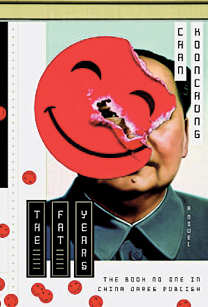 Still banned in China proper, this wonderfully subversive novel was first published in Hong Kong in 2009, when its 2013 setting made it a safely near-future tale. That’s a bit of a problem now, since the plot turns on events from two years earlier—that is, 2011—that Chan’s new Western readers know never happened. Even so, the sly conceit at the heart of his story remains not just metaphorically, but in a very real sense, literally true: a fat and happy China basking in its new-found prosperity, barely aware of a past month almost entirely excised from collective memory.
Still banned in China proper, this wonderfully subversive novel was first published in Hong Kong in 2009, when its 2013 setting made it a safely near-future tale. That’s a bit of a problem now, since the plot turns on events from two years earlier—that is, 2011—that Chan’s new Western readers know never happened. Even so, the sly conceit at the heart of his story remains not just metaphorically, but in a very real sense, literally true: a fat and happy China basking in its new-found prosperity, barely aware of a past month almost entirely excised from collective memory.
Something horrible scarred that missing month, but the ruling Communist party has managed to keep it out of public discussion and, somewhat to its own surprise, practically out of mind. The main character, Lao Chen, an inhabitant of Happiness Village Number Two, is as content as anyone with life in a nation that dominates the globe economically. The financial crisis that wobbled the Western world in 2008 took a drastic (fictional) turn three years later, destroying it economically. Only China has managed to thrive, to such an extent that Starbucks is now Chinese-owned.
But not everyone is enjoying the fat years. Chen keeps encountering such people, some marginalized in the new China (a former lover, now an Internet dissident; a former slave worker), some prospering (a real estate wheeler-dealer, a high-price prostitute). None can ignore the pull of the nagging, foggy past. Together they kidnap a senior government official and learn the surprising truth.
Collective amnesia is more than an apt theme for a contemporary Chinese novel; it’s arguably the greatest moral issue facing the country. Everyone reading The Fat Years knows what Chan is writing about: China’s real memory hole is stuffed full with the bloody suppression of the 1989 Tiananmen Square protests—still beyond the pale of open reference—while the truly effective engine of suppression, as a surprised regime found out in the novel, is not the secret police but willing public acquiescence, itself the child of prosperity.